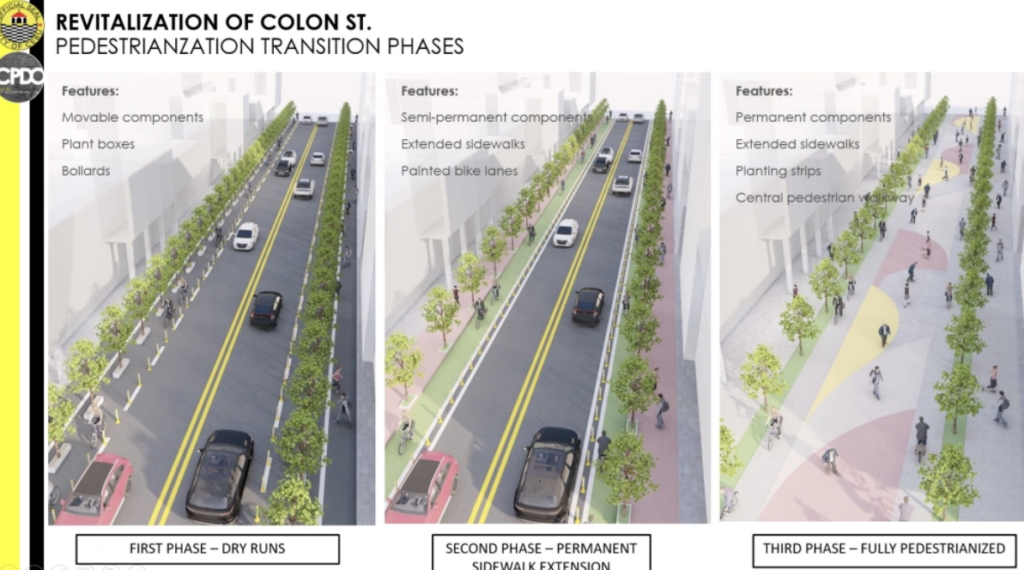Cebu City plans downtown pedestrianization with trees, walking paths starting year-end

CPDO said it will implement the pedestrianization of Colon Street in three phases. | Photo credits: City Planning and Development Office (CPDO)/ Cebu City News and Information
CEBU CITY, Philippines – Cebu City is forging ahead with another road development this year despite the controversies surrounding ongoing road infrastructure projects.
The city is targeting to commence the partial pedestrianization of its “Heritage Loop” before the year ends, according to City Planning and Development Office (CPDO) head Joseph Michael Espina.
Initially planned for May, the project was delayed due to the Palarong Pambansa event.
“Paningkamoton gyud nato nga ma-implement gyud siya within the year,” Espina said.
READ: 4 business owners in Cebu City slam CBRT ‘Link to Port’ project
‘Misplaced’ street lights in downtown area part of Cebu BRT project
Cebu City streetlights removed, to be reinstalled later – exec
The Heritage Loop encompasses key areas of the city’s historic district, including Colon Street, the linear park leading to the proposed Cebu-Cordova Link Expressway Guadalupe ramp in Barangay Ermita, the Carbon Public Market, and the City Hall Square.
It also integrates the “Link to Port” feature of the Cebu Bus Rapid Transit (CBRT) project, connecting Plaza Independencia to P. Del Rosario St.
Plans for pedestrianization
In a report from Cebu City News, Espina detailed plans to begin pedestrianization on Colon Street with scheduled road closures and a series of activities to kick off the initiative.
He explained that the project aims to revitalize local businesses, enhance pedestrian access to heritage sites, and mitigate urban heat through increased tree planting.
During the CPDO’s Paglantaw program on Sugboanon Channel, Espina cited a World Bank report warning that cities like Cebu could face exacerbated “urban heat island effects” due to rapid development and lack of greenery.
He noted that parts of the city experienced this effect during last summer’s mild El Niño, with heat indexes reaching 41 degrees Celsius, significantly higher than in previous years.
Pedestrianization is also expected to protect heritage structures from pollution-induced decay.
Espina said that many of the city’s heritage sites, such as the Basilica Minore del Sto. Niño, the Magellan’s Cross, and the Cebu Metropolitan Cathedral are deteriorating due to pollution. Reducing vehicle traffic in the historic downtown area could help mitigate this damage.
Furthermore, pedestrianization is seen as a catalyst for revitalizing local businesses. Espina expressed concern over the migration of businesses to malls, which he described as quasi-public spaces, in contrast to truly inclusive public streets.
By encouraging walking and reducing vehicle reliance, the city hopes to foster a thriving business environment in the downtown area.
READ: What’s the future of Cebu BRT? Phase 1 completion now uncertain
The pedestrianization plan for Colon Street will be implemented in phases.
Architect Nichol Maquiling from the CPDO’s Planning and Design Division explained that the first phase involves a dry run with movable components like plant boxes and bollards to separate vehicle and pedestrian traffic.
The second phase will introduce semi-permanent elements such as extended sidewalks and painted bike lanes.
The final phase will see full pedestrianization, rerouting vehicles away from Colon Street and converting it into a pedestrian walkway.
Support from city officials, including suspended Mayor Mike Rama and acting Mayor Raymond Alvin Garcia, has been strong. Public consultations with local businesses along Colon Street have also been conducted to gauge and incorporate their sentiments.
While not all stakeholders are convinced, Espina remains positive that the benefits of pedestrianization will eventually win their support.
The city has previously implemented minor pedestrianization efforts, such as the Colon Night Market and Gabii sa Kabilin, which Espina used as examples to encourage public backing for the broader initiative. /clorenciana
Disclaimer: The comments uploaded on this site do not necessarily represent or reflect the views of management and owner of Cebudailynews. We reserve the right to exclude comments that we deem to be inconsistent with our editorial standards.
